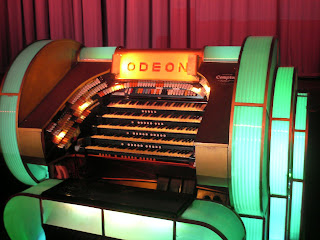A pleasant weekend with a friend of mine over from Worcestershire Robert ("Bob") Cole, who came along to check out Colchester once again, and to see
Round the Horne at the Mercury Theatre, in a touring production performing two radio broadcasts of the original classic radio series, notable for certain
outre elements such as the two gay (in both the old and new sense of the word) characters Julian and Sandy, played of course in the original by such icons as Kenneth Horne, Hugh Paddick, Betty Marsden and of course, Kenneth Williams. The actors given the unenviable task of emulating their 1950's counterparts I thought were very good vocal and facial imitations of the originals, in particular Robin Sebastian as Williams bringing out not only the great man's range of bizarre and wonderful characters but also his sharp sense of improvised repartee with the audience.
I found it not terribly dissimilar to recent radio broadcasts in the theatre that I've attended (such as
I'm Sorry I Haven't a Clue), and a pleasant evocation of the era in which it was broadcast, complete with lyrical and entertaining musical interludes from 'Not The Fraser Hayes Four'.
A slightly more peculiar slice of comedy nostalgia was to be found in a rare DVD collection of
Come Back Mrs. Noah, a sci-fi comedy written by Jeremy Lloyd and David set in a satirical 2050 drawing upon 1970's influences such as
Nationwide (aka. "Farandwide" presented by Gorden Kaye) and the British trade surplus, etc.
Unusually for Lloyd and Croft,
CBMN is not a situation comedy as such but an ongo

ing story in 6 chapters. I watched the series in baited anticipation of whether Mrs N. would ever get back home to Earth - sadly, the resolution is not a satisfying one. A pity in a way, because with the range of characters and actors on display, there was something to be made from their interaction, especially as they are all pleasantly older and less "sexy" than they certainly would be today if - perish the thought - the series were ever remade (British class distinction is also quickly established even in outer space between officers and underlings), rather than focusing all the time on silly props and even sillier jokes that usually involve Mollie Sugden in uncomfortable positions.
The fifth episode ("The Housing Problem") is quite promising and for me the most enjoyable, where the members of
Britannia 7 try to rehabilitate themselves with a simulated version of life back on Earth by inviting each other to tea, with mechanised butler and maid robots (played by Christopher Mitchell and Vicki Michelle), and underlining the fact that good science fiction is not really about faraway worlds, but in essence a window and a reflection on our own.
In all truth, this is a series that would normally have never got past the pilot episode - but with all its credentials, the BBC gave it the green light probably as an act of blind faith. Like
The Goodies and many other 70's comedy, it remains a show locked in its own time.



























